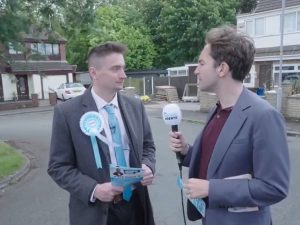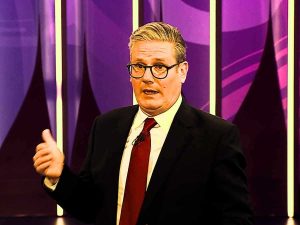Another day, another general election debate – this time, the ITV Debate on Thursday 13 June. Once more, there was posturing, outrage, but not a lot of anything other than hot air from the politicians present. However, what there was was a gaping hole where millions of people should have been – and £100bn of money, too. Because during the debate – like every one before it – no one even mentioned Universal Credit.
ITV Debate: the most tuneless septet on the planet
Much of the debate was a near-carbon copy of what the party representatives said on the BBC one on Friday 7 June – with the same lines being trotted out on every issue, with the same personal anecdotes also being regurgitated:
Take a shot everytime Angela Raynor says “I was a home care worker” #ITVDebate #GeneralElectionUK
— Andrew John (@itsandrewjohnm) June 13, 2024
The Tories’ Penny Mordaunt and Labour’s Angela Rayner were once again at each others throats:
Penny Mordaunt telling Angela Rayner “you’ve had 14 years…..” incase you’re wondering how fucking mental everything has become. #ITVDebate
— Mick (@nalaknip) June 13, 2024
Like the Keir Starmer/Rishi Sunak Sky News Debate, the audience found something to laugh at, at some point, during each politicians’ bluster. This was far-right Nigel Farage’s moment:
Nigel Farage: These people have lied to us repeatedly
Stephen Flynn: Says you… you’ve made a career of doing that
NF: I’ve always told the truth
Audience: 🤣#ITVDebate pic.twitter.com/fOxielXLzY
— Haggis_UK 🇬🇧 🇪🇺 (@Haggis_UK) June 13, 2024
But ultimately, the ITV Debate was a pointless exercise in shouting and grandstanding:
It mystifies me why ITV are holding this debate…a rerun of the BBC debate from last week but once again with weak moderating…what’s the point?? #itvdebate #GeneralElectionUK pic.twitter.com/131XsT3QuM
— Rhys Goode (@rhys_goode) June 13, 2024
However, none of the panelists nor the audience mentioned the ongoing chaos surrounding Universal Credit.
Universal Credit: the £100bn elephant in the ITV Debate room
People reliant on DWP social security have faced systemic discrimination, inequality, and cuts since the coalition government introduced Universal Credit in 2013/14. The Tory architects of the system claimed it would simplify the benefits process and make claimants better off in work. Yet, this was all lies.
The most recent report on Universal Credit in April by think tank the Resolution Foundation found that:
Seven-in-ten (71%) of the 9.8 million families who are eligible for either Universal Credit or legacy benefits are worse off in real terms on Universal Credit in 2024-25 than they would have been under the legacy system in 2013-14, with an average difference among all eligible families of minus £1,400 per year.
However, the Resolution Foundation makes clear this is due to successive Tory cuts – not the design of Universal Credit itself. These cuts about to a 6.7% fall in the real-terms value of benefits in April 2024 versus April 2013.
ITV Debate: what about the cuts?
What the think tank does make clear (and what the ITV Debate also avoided) is that many people have lost out under the benefit. Specifically:
- Some single parents are £1,700 a year worse off.
- Some single disabled people are £2,800 a year worse off.
- Families previously entitled to Employment and Support Allowance (ESA) are £2,100 a year worse off.
- Families were no-one works because of ill-health are £1,600 a year worse off.
- Nearly half a million families with disabled people, previously entitled to ESA, have been thrown into the poorest 20% of society.
As the Resolution Foundation alludes to, Universal Credit has effectively made working people better off, and chronically ill and disabled people poorer. It also sanctions people more than legacy benefits. And, it has done nothing to shift working people off benefits. The Resolution Foundation notes 5.3 million working people are entitled to Universal Credit. Work really does not pay.
The forgotten millions
But let’s be clear, as the Resolution Foundation is, but as the ITV Debate was not: everyone is ultimately worse off overall under Universal Credit. The 6.7% real-terms cuts to benefits plus the design of Universal Credit has meant overall, £100 billion has been cut from the welfare state since 2013/14.
Yet none of the parties are doing anything remotely realistic to address this disaster. The now most-progressive lot, the Green Party, is only offering a £40-a-week uplift. This would not make up for the losses hundreds of thousands of chronically ill, disabled, and single people have faced.
The likely next government, the Labour Party, is only saying it will “review” Universal Credit. Given it has gone out of its way to paint itself as the party of ‘working people’, Labour is unlikely to change the benefit either.
So, as the ITV Debate showed, child-and working-age benefit claimants – all roughly nine million of them – are not even on the general election agenda.
Featured image via ITV – screengrab




